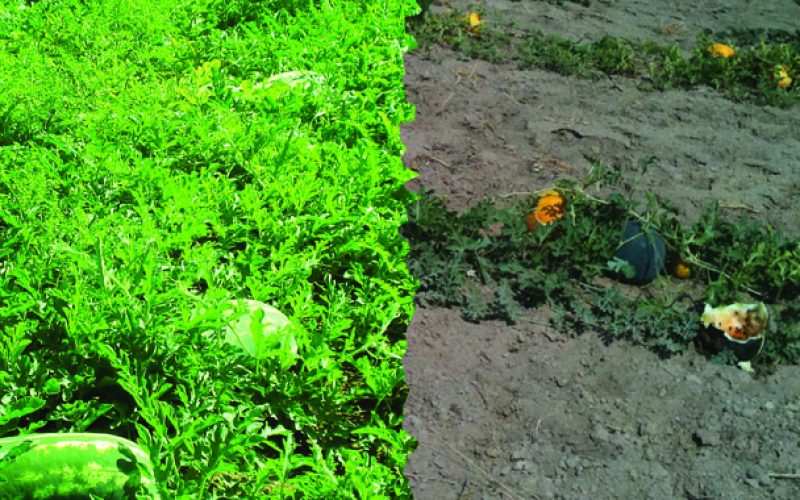Farmers in Northwest Arkansas are running out of grass and water, said Johnny Gunsaulis, U.S. Department of Agriculture Extension Agent. The extreme weather conditions happening throughout the state, specifically the severe drought currently affecting NWA and the record-high, 12-month temperatures have received much attention. But how is it affecting the local farmers who depend on the natural occurrence of rainfall and stable weather patterns for their livelihood?
The Free Weekly asked several farmers and Gunsaulis how they’ve been impacted by these record-breaking extremes — specifically how the weather has affected their crop, their finances and their plans for the future.
Gunsaulis said many farmers are struggling. Cattle farmers are barely able to afford the high hay and grain prices necessary to keep their herd at standard weight, while produce farmers are watching their crops shrivel and yield less and less.
The last 12 months have been the hottest on record since record-keeping began according to the National Weather Service, which means the natural cooling and heating cycles are being disturbed.
For farmers such as Nou Lee, the dry heat means less production, despite having a drip watering system to make up for the lack of rainfall.
“My green beans flower a lot but they can’t produce beans at all. That’s how bad it is. Even the squash and zucchini — we’re not getting anything out of them,” Lee said.
She runs Ameriasians Farm, the second best seller at the Fayetteville Farmers’ Market, and by looking at her stand you wouldn’t think she had nothing growing. But the loss must be looked at on a whole season spectrum, which Lee said is showing signs of being one-fourth as productive as usual, cutting into her overall profit by as much.
Lori Boatright, public coordinator for the Farmers Market, said because of the mild winter, things are starting early, but then finishing fast. She said the market as a whole has not seen any drop in income, but may by the end of the year if the farmers don’t get relief in the form of rain.
Debra Elam of Wren Thicket Farms, who started Wren Thicket’s Market on 1041 S. School St. in Fayetteville, said the last two years have been the worst she’s seen in the more than
50 years her family has been farming melons. She estimated her profit will take a 25 percent cut, barely allowing her to recover her expenses.
Last year, she didn’t harvest melons at all because they literally baked in the field.
“When you cut them open, they were mushy inside,” she said.
Luckily, she learned a lesson, so this year — when the high temperatures caused the melons to ripen sooner than usual — she picked them before they had a chance to overheat.
Sara Pollard of Mountain Greenery Farm said they haven’t been short on water in the 30 years she’s had a spring-fed lake on their property — until this year. She expects her profit to be cut in half this year, and is now considering hauling water to the property to finish out the season.
That’s what many cattle farmers are contemplating as well, Gunsaulis said. It’s either haul water to the cattle, or cattle to the water as ponds become cracked dirt.
As for long-term solutions, Gunsaulis said many farmers are waiting out the extreme weather to see if it passes.
Elam used the beneficial planting method that allowed to grow what she called, “weeds” to help shade the melons, which worked to an extent.
Lee ensures her financials stay stable — although she expects a 25 percent drop in profit this year — by diversifying her crops and growing at least 10 rows of each.
Pollard said she knows what grows best here when temperatures and rainfall are stable and she’ll try those varieties again next year.
So what keeps these farmers going back each year, when in the last two years they’ve struggled to make back costs? Elam said someone explained it best to her several weeks ago: “Farmers are the eternal optimists. We always have next spring.”




